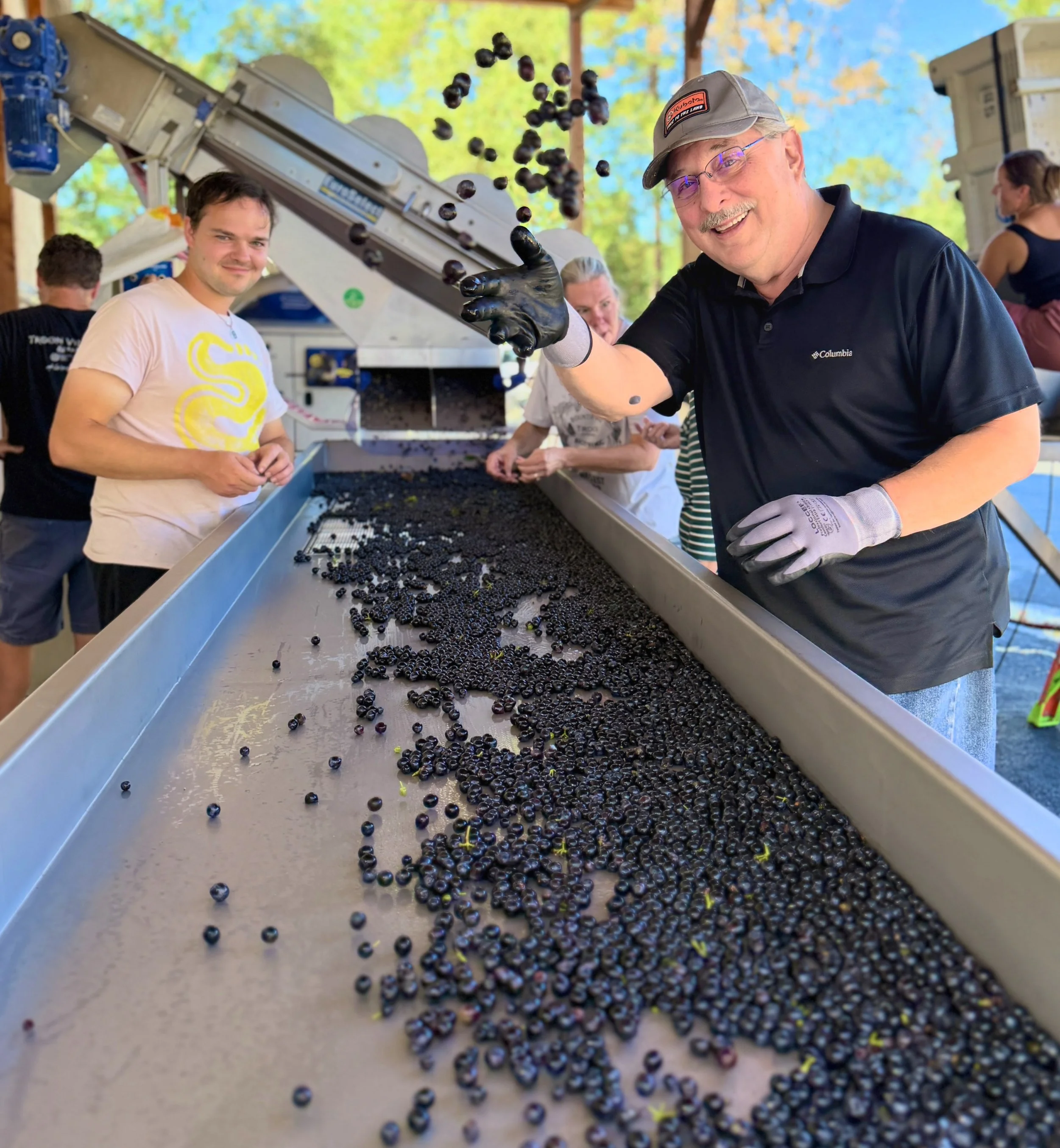Harvest 2025
I keep finding earwigs in my hair – and everywhere else for that matter. My right hand looks like a red balloon from a Yellowjacket sting. My feet hurt and I'm sticky everywhere. It must be harvest season again. I love it.
Dawn breaks with the snip, snip, snip sound of picking crews starting to hand-harvest our grapes. It has been a Goldilocks-type vintage, not too hot – just right. While each vintage is always a learning experience, this is particularly amplified for us at Troon, as our youngest blocks are producing their first crop – our first lesson – while our other blocks mature and continue to educate us about their individuality. While stressful and exhausting, each harvest shares our hopes and vision for the wines we will create.
Making wine is a unique combination of farming and an almost industrial production method. Processing grapes can be like working on an assembly line. Half-ton bins of grapes arrive one after another, hour after hour. However, the experience is defined by the wines you aspire to make. Creativity and intention transform the experience of harvest from grind to a joy.
I’ve seen many harvests. They have ranged from semi-trucks, working like dump trucks, disgorging their tons of machine-harvested grapes into augers, washed in with fire hoses, to vintages with optical sorters that only spit out perfect “blueberries” after blowing away everything else. The first way of making wine is soulless; the other sorts the soul out. One doesn’t care what goes in; as you adjust with additives later, the other delivers cold, unnatural perfection.
Nature strives for balance until we rudely interrupt it. Somewhere between industrial production and sterile perfection, a soulful winemaking tradition still exists. That’s the wine world we aspire to live in at Troon Vineyard.
The soul of a wine grows in the vineyard, and from how you farm it. While the pruned, long rows of vines in a vineyard are not what nature intended, we can strive to work in harmony with evolution to make our vines feel truly at home in our soils. The first step is understanding that the soul we want to achieve in our wines is the soul of each vine. Our farming should encourage each to express their individuality. That diversity gives birth to complexity in your wines. It is what makes your vineyard unique.
We are unique too. It shows in the wines. Winegrowing for us is farm and farmers in harmony. Both are expressed in our wines. Everyone is tired and nerves a bit frayed, but there remains a foundation of joy in everyone’s work. It is a joyful thing to be part of nature’s process.
Last January, we took a two-day retreat to evaluate the previous vintage and envision the next. As well as the wines from the 2024 vintage have been received — we knew that our vineyard could give us far more as long as we kept our end of the bargin and gave far more back to our vines. Every bunch of grapes we take is filled with nutrition that has been gifted by the sun and taken from our soils. While we can depend on the sun to return for the next vintage, what we have taken from our soils must be replenished. That is the work that nature has selected for the farmer — we are a link in that system.
The question for the farmer is to feed the soil or the plant. Feeding the soil is investing in the future of your farm; feeding plants directly is an attempt to repair the damage done. That’s a short-term fix. Vines evolved to live in symbiosis with mycorrhizal fungi. The vines take the energy harvested from the sun and share it with the fungi in the soil. In return, the fungi transform nutrients in the soil into a form the vines can use. Chemical and tillage-heavy agriculture destroys the fungi in the soil, leaving plants to rely on direct chemical applications to survive. A healthy, harmonious neighborhood is replaced by drug addicts waiting for a fix.
At Troon, we are a part of the harvest, a step in a natural system. We are not on an industrial assembly line manufacturing a product, but a partner in the ancient process of winemaking. Making wine does not have to be like making widgets. Both wine and beer are just another crop that farmers have grown for millennia. It is an honor to be part of nature’s continuum.
So, despite the bugs, bruises, tired muscles and spirit, harvest continues to generate both excitement and exuberance for everyone at Troon. We’re lucky to be a part of something that connects us to generations past and to nature itself. The joy we have in making our wines will be shared in the joy our wines give to the people we can share them with.
We are all in this together.
